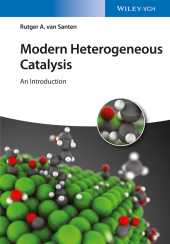 Neuerscheinungen 2017Stand: 2020-02-01 |
Schnellsuche
ISBN/Stichwort/Autor
|
Herderstraße 10
10625 Berlin
Tel.: 030 315 714 16
Fax 030 315 714 14
info@buchspektrum.de |

Rutger A. van Santen
Modern Heterogeneous Catalysis
An Introduction
1. Auflage. 2017. XXIV, 564 S. 349 Farbabb., 40 Tabellen. 244 mm
Verlag/Jahr: WILEY-VCH 2017
ISBN: 3-527-33961-2 (3527339612)
Neue ISBN: 978-3-527-33961-7 (9783527339617)
Preis und Lieferzeit: Bitte klicken
Written by one of the world´s leading experts on the topic, this advanced textbook is the perfect introduction for newcomers to this exciting field.
Concise and clear, the text focuses on such key aspects as kinetics, reaction mechanism and surface reactivity, concentrating on the essentials. The author also covers various catalytic systems, catalysis by design, and activation-deactivation. A website with supplementary material offers additional figures, original material and references.
PART I: PHYSICAL CHEMISTRY AND KINETICS
Heterogeneous Catalysis
Heterogeneous catalytic processes
Physical chemistry, elementary kinetics
The state of the working catalyst
Advanced kinetics, breakdown of mean field approximation
PART II:MOLECULAR HETEROGENEOUS CATALYSIS
Basic quantum chemical concepts, the chemical bond revisited (jointly written with I. Tranca)
Chemical bonding and reactivity of transition metal surfaces
Mechanisms of transition metal catalyzed reactions
Solid acid catalysis, theory and reaction mechanisms
Zeolitic non-redox and redox catalysis, Lewis acid catalysis
Reducible solid state catalysts
Rutger Anthony van Santen is professor at the Institute of Molecular Complexity at Eindhoven Technical University (TU/e, The Netherlands). He received his doctorate as theoretical chemist from Leiden University in 1971. After his initial stay at Shell Research (Amsterdam, The Netherlands), he became professor in Catalysis at the Technical University Eindhoven (The Netherlands) in 1986. In 1993, van Santen was the founding director of the Netherlands Institute of Catalysis and from 2001 to 2005 he was Rector Magnificus of TU/e. He is a member of the Royal Netherlands Academy of Arts and Sciences and a Knight in the order of the Dutch Lion. His research interests are in the field of the molecular aspects of heterogeneous catalysis with the following three main themes: computational studies of surface-chemical reactivity, mechanism in heterogeneous catalysis and physical chemistry of catalyst synthesis.


